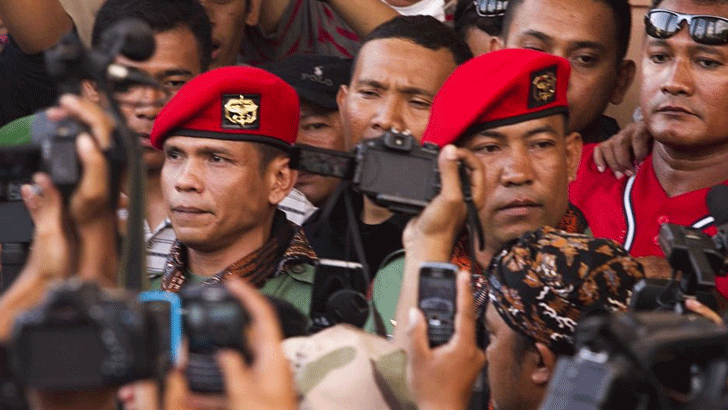Renewed calls for Indonesian military reform

While rights groups have welcomed the conviction last month of 12 soldiers from the army’s notorious Special Forces (Kopassus) for the murder of four civilians in March, lenient sentences and a failure to investigate senior officers have led to renewed calls for military reform.
In the early hours of 23 March, a group of heavily armed men stormed the Cebongan penitentiary in the Central Java city of Yogyakarta. After forcing their way into the prison, they executed four detainees awaiting trial for allegedly murdering former Kopassus member First Sergeant Heru Santoso in a drug-related brawl three days earlier.
The four should have been detained at the Yogyakarta police detention centre but were transferred to Cebongan on 22 March, allegedly because the detention centre ceiling was damaged. It was later revealed that Yogyakarta police chief Brigadier General Sabar Rahardjo received intelligence that Kopassus soldiers were planning an attack on the police compound to avenge their colleague. Why Rahardjo never reported this to his superiors or military (TNI) counterpart has not been explained.
Suspicion immediately fell on the military due to the strong motive and the military precision of the operation. The TNI top brass, however, were quick to quash such speculations; regional commander Major General Hardiono Saroso insisted that none of his soldiers were involved.
Then on 4 April the TNI announced that soldiers from the Kopassus Group 2 had confessed to the killings. Twelve Kopassus soldiers were later indicted. Along with Rahardjo, Saroso was removed his post.
Kopassus killers
Kopassus has been implicated in some of the worst human rights violations and war crimes committed by the TNI, with only a handful of its members ever being held accountable.
Then called RPKAD and under the command of President Susilo Bambang Yudhoyono’s father-in-law, the late General Sarwo Edhie Wibowo, Kopassus spearheaded the mass murder and terror campaign after former President Suharto and the military seized power in 1965, in which 1-2 million communists and left-wing sympathisers were killed, and hundreds of thousands of others interned without trial.
The unit was involved in the murder of five Australia-based journalists at Balibo in 1975, prior to Indonesia’s full-scale invasion of East Timor. Kopassus and other troops were indicted by UN-backed prosecutors in East Timor for crimes against humanity during the 25-year occupation and in 1999, but remain at large. Although some Kopassus officers were convicted of the kidnapping of student activists in 1997-98 and the 2001 murder of leading West Papuan figure Theys Eluay, the majority have evaded prosecution.
Kopassus was also implicated in the 2002 fatal ambush of two US teachers and an Indonesian national near the Freeport mine in West Papua, widely believed to be retaliation for a decision by Freeport to stop paying the TNI for “security services”. According to a 2009 report by New York-based Human Rights Watch (HRW), Kopassus continues to be involved in arbitrary arrest, detention and mistreatment in West Papua.
The US and Australia severed military ties with Indonesia after TNI-backed militias rampaged through East Timor following the UN-sponsored independence referendum in 1999. The US began quietly restoring contacts the following year and by 2005 had resumed full engagement with the TNI, although this still excluded Kopassus. Ignoring criticism from rights groups, in 2010 the Barack Obama administration lifted its ban on training Kopassus.
The Australian government resumed cooperation in 2003, arguing that “Kopassus had come a long way from an era of human rights abuses”. In 2005 Canberra announced it would restart joint counter-terrorism exercises with Kopassus in order to “safeguard Australian lives and interests abroad”. A 2004 report by the Strategic and Defence Studies Centre said that Kopassus had not reformed and that cooperation in the interest of saving Australian lives is questionable given its chequered history of anti-terrorist operations.
Military trials
The killings renewed calls to amend the 1997 Military Tribunal Law under which all crimes committed by TNI personnel are prosecuted and tried by military courts. During the UN Universal Periodic Review of Indonesia’s human rights record in 2007 and 2012, Jakarta committed to reforming the military tribunal system but has not done so.
Despite these calls, the government and the TNI insisted that the soldiers be tried by a military tribunal. Yudhoyono, while issuing a strongly worded statement condemning the soldiers’ actions, stopped short of calling for a civilian trial.
After a five-month investigation described as lacking transparency and accountability, the trials began at the Yogyakarta Military Court on 20 June, characterised by an atmosphere of intimidation and harassment. Paramilitary groups held noisy protests outside the courthouse while inside they repeatedly disrupted proceedings. The judges did nothing to stop this, and several eyewitnesses failed to testify for reasons the court did not explain.
On 5 and 6 September, the court sentenced the three most directly responsible for the killings to 6-11 years in jail and discharged them from the TNI. The remainder were sentenced to between four months 20 days and one year and nine months but not discharged.
While HRW and Amnesty International said that the verdicts marked an important departure from the usual impunity given TNI personnel, the sentences did not match the gravity of the crimes, and the tribunals were tainted by witness intimidation and hampered by superficial investigations.
The Setara Institute for Democracy and Peace called the verdict fair, but criticised the investigation for stopping at low-ranking soldiers: “[S]till, their superiors remained untouched. It seems like the soldiers are being sacrificed to keep the institution’s name clean.”
On 20 September, it was reported that eight of the soldiers had been released, either because their detention terms had exceeded their sentences or because the detentions were not extended. Since they were not discharged from the TNI, they are presumably free to return to active duty.
[For the latest news and information on Indonesia visit Asia Pacific Solidarity Network.]